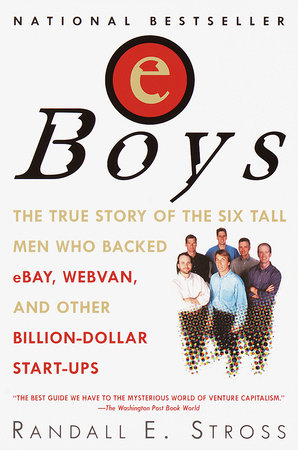Excerpt
eBoys
When eBay, a small Internet auction company based in San Jose, California, sought venture capital, it had to pass an informal test administered by the venture guys before they would consider making an investment: Was there a reasonably good likelihood that the investors could make ten times their money within three years? In eBay's favor, the company displayed some mo -- momentum measured in revenues and profitability. It did not have much visibility in the public at large, however, and the growth potential of its business -- what seemed to be nothing more than a flea market online -- was unproven. There was risk that the best that could ever be said about it would be that it was a good little business, with the emphasis on little.
The venture capital firm that in the end backed eBay was Benchmark Capital, itself a start-up, then only two years old. When Benchmark invested $6.7 million in eBay in 1997, the auction company's valuation was put at $20 million. eBay grew, prospered, went public. In September 1998, after the first day of public trading, eBay's market capitalization was $2 billion, and Benchmark's original $6.7 mil-lion stake was now worth $400 million. Little more than three months later, the stock had gained more than 1,300 percent. By the next spring, the company was valued at more than $21 billion; the value of Benchmark's stake had grown 100,000 percent in less than two years' time, making it the Valley's best-performing venture investment ever. The eBay story happened to unfold right in front of my eyes -- and my tape recorder; I must confess I was as surprised as anyone.
A year before eBay knocked on Benchmark Capital's door, I had knocked there, interested in writing a book about a corner of the financial world whose inner workings remained shrouded, even to those in other precincts of professional money management. Yet venture capitalists, who were concentrated in Silicon Valley, were entrusted with ever increasing amounts of capital by institutions, such as university endowments and charitable foundations, to invest in newly formed companies. In 1996 venture funds attracted $10 billion in capital; in 1997 the total jumped to $20 billion; and in 1998 it passed $26 billion.
It was a form of investing that brought higher risk than investing in shares of publicly traded companies found in the stock market, but it offered the prospect of higher returns, too. As for the venture capitalists, they received a significant cut -- at least 20 percent -- of any resulting gains in the portfolio's investments, so in flush times their personal wealth, on paper at least, grew as fast as the valuations of the new companies they funded.
Anyone who had followed the rise of Netscape, Amazon, and Yahoo -- all were venture-backed -- had already figured out that the venture guys were seated at the center of the New Economy. Endowment-fund managers who had not previously developed connections to the top venture capital firms pounded their fists on closed doors, begging for entry, but even with recent increases in size, the funds were already oversubscribed.
Business-school graduates headed to Silicon Valley in numbers never seen before, spurning six-figure salaries with management consulting firms to seek their fortunes with venture-backed start-ups. It appeared that entrepreneurial fever was spreading well beyond business schools, too. One in twelve American adults surveyed in the spring of 1999 said that they were at that moment trying to found a new business, and some unknowable multiple of that number surely daydreamed of such. Entrepreneurship was increasingly touted as a panacea, the best means of fighting poverty, according to advocates in nonprofit initiatives that sprang up to teach entrepreneurship in neighborhood classes, schools -- even in kindergartens.
And all of these entrepreneurs and would-be entrepreneurs and institutional investors and individual investors -- the entire money culture -- trained their attention on the venture capitalists, who were the gatekeepers to the world of high-tech start-ups, the place where new firms grew the fastest and investors reaped the greatest returns. The venture guys made decisions that appeared to have oracular power. By the approach of the year 2000, the venture guys comprised the symbolically preeminent profession that served to define the zeitgeist in the nineties in the same way that investment bankers had in the eighties, investigative journalists had in the seventies, and hippies -- as the antiprofession -- had in the sixties.




